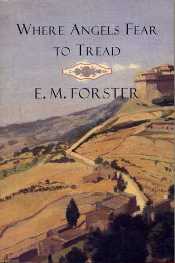She was silent. This cruel, vicious fellow knew of strange refinements. The horrible truth, that wicked people are capable of love, stood naked before her, and her moral being was abashed. It was her duty to rescue the baby, to save it from contagion, and she still meant to do her duty. But the comfortable sense of virtue left her. She was in the presence of something greater than right or wrong.
Lilia Herriton is sent on a trip to Italy by the family of her deceased husband, who hope that the exposure to culture might refine her sensibilities a little bit--and perhaps just get her out of their hair for a little while. But her rashness and poor judgment follow her to Italy, and word is cabled back to England that she has done the unthinkable: married an Italian, a passionate but indigent man who is the son of a dentist. Though the marriage is unhappy, it makes her more or less someone else's problem, until she commits another social faux pas--she dies--and her stepbrother Philip is compelled to travel to Italy to try to convince her widower to give up their infant son in exchange for money.
Where Angels Fear to Tread was Forster's first novel, and it's hard to recognize the author who would later write a book as mysterious and subtle as A Passage to India. The novel wears its influences much more on its sleeve, as first novels sometimes do, in this case the unmistakable whiff of Henry James pervades everything. The elements of culture clash between England and Italy are recognizable in A Room With a View, but Where Angels Fear to Tread lacks the sensitivity or moral urgency of that book. In fact, it sort of stinks. I found myself wondering the whole time if Forster wants us to really take seriously the motivations of Philip, his sister Harriet, and their accomplice Caroline Abbott, to steal away a baby for the simple reason that it couldn't possibly be appropriate to be brought up Italian.
In the end, I think the book spurns the provincial moralism I suspected it of having: Miss Abbott, then Philip, become convinced that their mission is mistaken as they get to know the father, Gino, better, and only the prudish Harriet cannot be budged. Harriet's intransigence leads to an ending I found outlandishly and disproportionately violent. But even still, the moral question at the book's heart--is it better for a baby to be brought up with civilization or love--seems so foreign to me to be almost incomprehensible, and makes the book seem ridiculous. But of course, other novels--like Henry James'--make the moral demands of Victorians seem compelling, if not sympathetic, so I think it's fair to say that Where Angels Fear to Tread simply doesn't work, and is the product of a writer who had yet to find his own real voice.


No comments:
Post a Comment